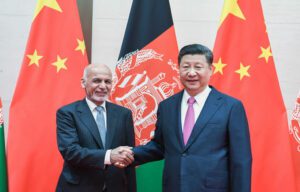China’s Policy On Afghanistan
Context:
Beijing’s recent efforts to portray China as a country that is now strongly invested in tackling “international hot-button issues” are reflected in its position paper on its policies in Afghanistan.
Points to Ponder:
- China’s attitude on Afghanistan: Beijing’s strategy towards Afghanistan and the areas it will prioritise in its engagement with the Taliban moving forward are clearly outlined in Beijing’s 11-point position paper titled “China’s position on the Afghan issue.”
- The article highlights the fundamental beliefs that guide China’s policy decisions, including the “Three Respects” and “Three Nevers.” China respects Afghanistan’s independence, sovereignty, and territorial integrity as well as the people of Afghanistan’s free will, religious convictions, and national traditions.
- China criticises the West for failing to uphold its obligations to Afghanistan, attributing the situation to the West’s choice to militarily interfere and impose its version of democracy without taking into consideration Afghanistan’s unique qualities.
- Alternative regional groups: China calls on the international community to approach the Afghan issue comprehensively, fairly, and objectively. It also supports the use of alternative regional groups, such as the Shanghai Cooperation Organisation, the Moscow Format Dialogue, and the China-Afghanistan-Pakistan Trilateral Foreign Ministers’ Dialogue, which does not include the US and its allies.
- Humanitarian approach: China avoids recognising its interests in the country and portrays its involvement in Afghanistan in exclusively humanitarian terms, focusing on good neighbourliness and reciprocal respect for its neighbours.
- Security concerns: China calls for a bilateral and international strategy to counter the “Three Forces” of terrorism, extremism, and separatism. China recognises the threat of terrorism emerging from Afghanistan and its potential to attack Chinese interests and troops.
- Humanitarian approach: China avoids recognising its interests in the country and portrays its involvement in Afghanistan in exclusively humanitarian terms, focusing on good neighbourliness and reciprocal respect for its neighbours.
- China takes a purely humanitarian approach to its involvement in Afghanistan, avoiding acknowledging its interests in the nation and emphasising good neighbourliness and reciprocal respect for its neighbours.
- A bilateral and global strategy is needed to combat the “Three Forces” of terrorism, extremism, and separatism, according to China, which is concerned about security. China is aware of the danger terrorism originating in Afghanistan poses and it’s potential to target Chinese troops and interests.
Detailed Analysis
- Following the “Three Respects” and “Three Nevers”: China respects the sovereignty, independence, and territorial integrity of Afghanistan. China also recognises the autonomy
- , religious convictions, and cultural traditions of the Afghan people. Furthermore, China never interferes in the internal affairs of Afghanistan, never looks out for its interests there, and never aspires to a so-called sphere of influence.
- Supporting a moderate and responsible governing style in Afghanistan: China believes that Afghanistan will establish an inclusive and open political system and pursue a moderate and responsible foreign and domestic agenda. China also expects Afghanistan to maintain positive relations with all nations, particularly its neighbours. China also expects that the Afghan Interim Government will safeguard the fundamental rights and interests of every Afghan, including women, children, and members of all ethnic groups.
- China will keep trying its best to assist Afghanistan with growth and reconstruction while promoting peace in the country. China will work with Afghanistan to develop strategies and carry out its aid commitments, encourage steady economic, trade, and investment progress, and aggressively carry out cooperation in areas including healthcare, alleviating poverty, agriculture, and disaster mitigation. Additionally, China promotes Afghanistan’s inclusion in regional economic connectivity and cooperation and encourages its involvement in the Belt and Road Initiative.
- Supporting Afghanistan’s tenacious and effective fight against terrorism: The cornerstone and requirement for progress is security. The UN Security Council has recognised the East Turkestan Islamic Movement (ETIM) as a terrorist group, and the Chinese government has formally designated it as such. Security in China, Afghanistan, and the surrounding countries is seriously threatened by ETIM forces there. China sincerely hopes that Afghanistan will uphold its resolve and implement stronger measures to ruthlessly combat all terrorist elements, including the ETIM. China also hopes that Afghanistan will sincerely take steps to protect Chinese and other foreign nationals as well as Afghan institutions and projects.



